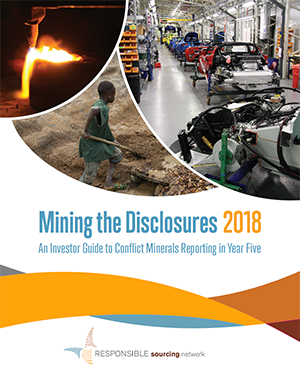The Responsible Sourcing Network (RSN), is a project of the nonprofit organization As You Sow, dedicated to ending human rights abuses and forced labor associated with the raw materials found in consumer products. On October 18, 2018, RSN released its Mining the Disclosures 2018: An Investor Guide to Conflict Minerals Reporting in Year Five report, which “analyzes 206 companies’ supply chain due diligence efforts regarding conflict minerals, including tin, tantalum, tungsten, and gold, or 3TG. In the fifth consecutive year of analyzing companies’ conflict minerals compliance and reporting, the report shows that a large number of the companies’ scores stayed flat or decreased.”
Read the full press release at https://www.sourcingnetwork.org/press-release-mtd-2018. You can download this year’s report, those from previous years, and watch a webinar about the 2018 report at https://www.sourcingnetwork.org/mining-the-disclosures.

According to RSN, “The technology sector outperformed all others, while laggard industries included integrated oil & gas, steel, business services, and building materials. Innovative companies showed constant improvements, including increased participation in on-the-ground initiatives, proactive risk assessments, and comprehensive risk mitigation measures. However, compared to 2017, a majority of companies’ scores that reflect alignment with the OECD’S Conflict Minerals Guidance declined. The results show a global lack of desire to improve due diligence practices over the last few years.”
“Conflict minerals” include tin, tantalum, tungsten and gold (aka 3TG). They are so called because these minerals are often sourced from the Democratic Republic of Congo (DRC), which is one of the most mineral-rich countries in the world, and in recent years, unfortunately also one of the most war-torn. Militant groups controlling mines have used violence, including murder, torture, rape and other sexual violence, forced labor and use of child soldiers, in their control of the populace to further their profit from sale of these minerals and their war efforts. Conflict minerals are used in a wide variety of electronic devices, and are also found in a variety of other products, including jewelry, dental products, tools, biocides, ammunition, medical devices, and others. For more information, see https://www.globalwitness.org/en/campaigns/conflict-minerals/ and https://en.wikipedia.org/wiki/Conflict_resource#Conflict_minerals.
Section 1502 of the Dodd-Frank Wall Street Reform and Consumer Protection Action, passed in 2010 and implemented starting in 2012 by the Securities and Exchange Commission, requires that all companies publicly traded in the the US with products containing any of the four conflict minerals report on the source of the minerals in their supply chain. This required transparency has not eliminated human rights issues associated with conflict mineral sourcing, but it has demonstrably improved conditions for Congolese miners. Before passage of the law, the UN reported that nearly every mine in Congo was controlled by armed groups. As of 2016, the independent research institute, International Peace Information Service (IPIS) found that 79% of “3T” miners surveyed in eastern Congo were working in mines where no armed group involvement had been reported. (See https://enoughproject.org/special-topics/progress-and-challenges-conflict-minerals-facts-dodd-frank-1502).
RSN cites the Trump administration’s “contempt for regulations” and threats made last year to “suspend Section 1502 of the Dodd-Frank Act” as part of the reason for the decline in corporate due diligence related to conflict minerals sourcing. “The disregard of corporate responsibility for conflict minerals during the Trump administration is concerning,” said Raphaël Deberdt, author of the Mining the Disclosures 2018 report. “The increasing neglect of the conflict minerals legislation from some companies over the past few years has been a source of human rights abuses in the Democratic Republic of the Congo. And these abuses extend beyond the 3TG sphere.”
According the RSN press release: ‘Companies involved in mineral supply chains — from mines to retailers — now face additional challenges that must be integrated into corporate risk mitigation frameworks. The increasing importance of cobalt, lithium, and nickel in the automotive and technology sectors should trigger red flags in compliance departments in a broader risk context, including environmental degradation, organizational health and safety, human rights, and community impacts. Similarly, the upcoming EU regulation will necessitate increased due diligence from importers of 3TG, not only from the Congo region, but from all conflict-affected and high-risks areas. “The results of this year’s report demonstrate the need for an increase in regulatory enforcement and investor engagement that urge companies to undertake proactive due diligence efforts,” said Patricia Jurewicz, vice president of Responsible Sourcing Network. “These programs must continuously improve to address and mitigate the evolving material risks associated with conflict mineral supply chains.” ‘
RSN further asserted that “leading companies” such as Intel, Microsoft, Apple, Qualcomm, Ford, Royal Philips, and HP “prove that taking a due diligence approach to reduce harmful impacts on the communities producing the raw materials in our electronics is an achievable and beneficial business model.”
The Mining the Disclosures report was sponsored by As You Sow and the Responsible Minerals Initiative (RMI), which is holding its annual conference on October 31-November 2, 2018 in Santa Clara, CA.
